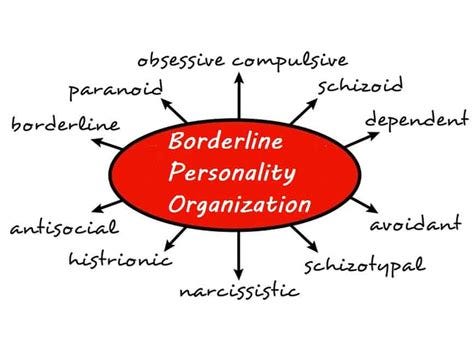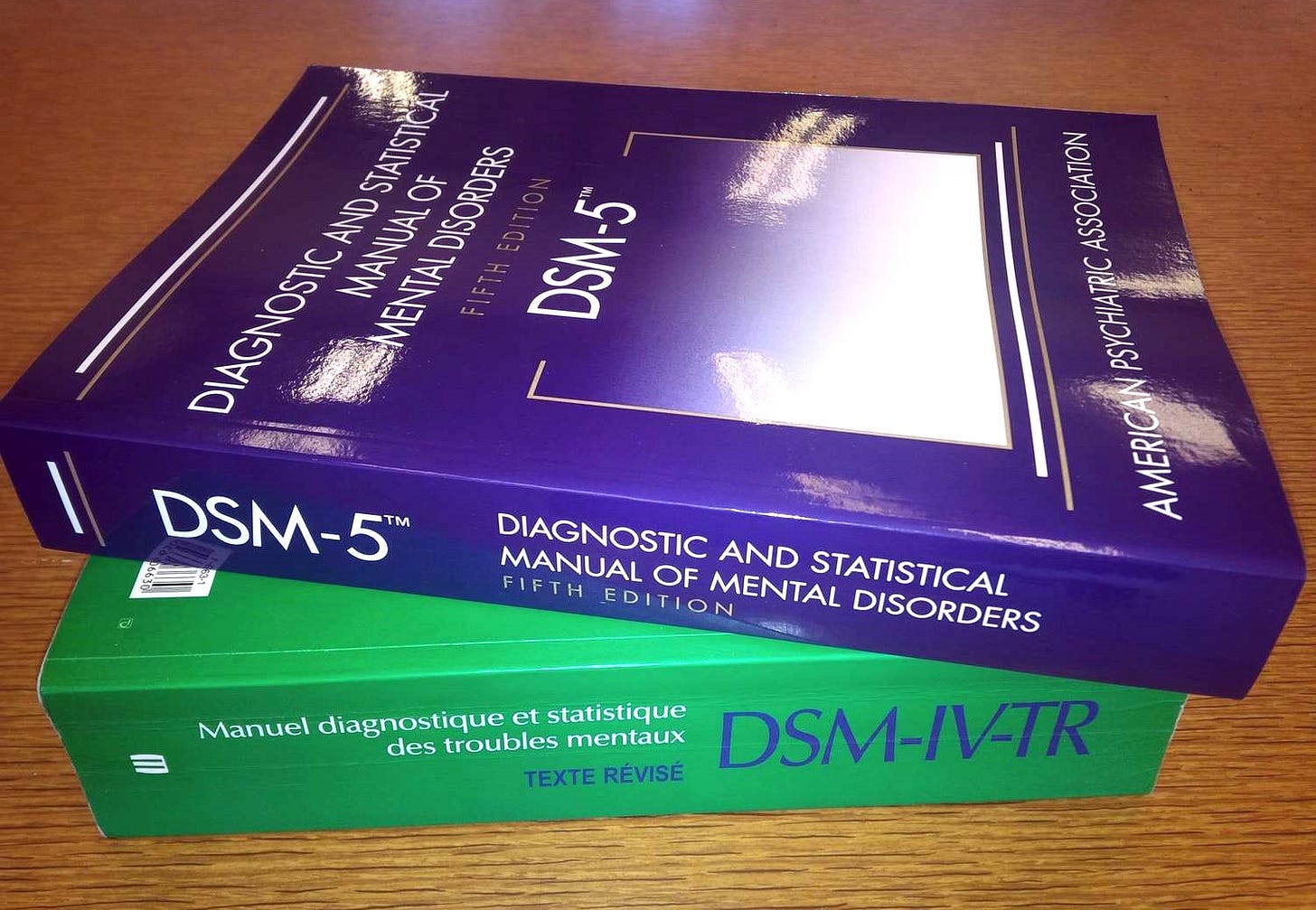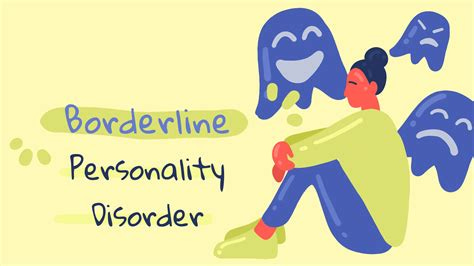How to isolate a personality disorder🙎♂️
Wayward psychiatrists straightjacketed, injected, and forced to believe the psyop
The Isolation of a personality disorder like Narcissistic or Borderline Personality (BPD) has heated up lately, almost eclipsing virus isolation in popularity. Stick to the end of this enchanting post to find out the TRUTH about personality disorder isolation and the reality of psychotherapy-it ain’t good.
Let’s see how far we can get in some personality disorder isolation trials.
Trial 1: Isolation from the American Psychiatric Association’s book of psychiatric diagnoses called the DSM (Diagnostic and Statistical Manual of Mental Disorders).
From here:
👉 Sounds like most everybody I know. Even people on-line that force me to make posts about their behavior.
I want all of you to be clear,
There is no objective biological parameter that is connected to the criteria listed for a personality disorder.
All the symptoms are subjective subject reports, or “pseudo-objective” observations like facial expression or human interactions, etc. “Pseudo-objective” because these are observations that can be described differently by different observers and the exact impetus for these observations are only subjective reports by the subjects.
Personality disorders vary significantly in their manifestations.
👉 Is that like viruses, some have spikes, some inclusions, some round, some bar shaped?
All are believed to be caused by a combination of genetic and environmental factors.
👉Let me get this straight, there is a cause of something that can’t be proven to actually exist, and since those things may exist, they are believed to have a cause which makes these non-existent descriptions real things. That is one hell of a merry-go-round.
Diagnosis is based on clinical criteria.
👉This means Dr’s guess work…I mean opinion.
And yes, the DSM has had its own Gain of function from DSM-I up to DSM-5!
In 1952, the
Rockefeller FoundationAmerican Psychiatric Association (APA) published the DSM-I. The DSM-II, released in 1968, attempted to incorporate the psychiatricloreknowledge of the day. It was heavily influenced by psychoanalytic concepts (aka a way for Intel to get private information on people and to deem them mentally ill, just in case they need quarantine).
Published in 1980, DSM-III’s goal was to improve the validity of psychiatric diagnoses It also removed much of the psychoanalytic thought in favor of a more descriptive and categorical approach [👉They didn’t know WTF was going on up to 1980 so the racket needed a tune-up].
Published in 1994, the DSM-IV reflected numerous changes in the understanding of mental health disorders. Some diagnoses were added, others subtracted or reclassified [👉They mean it’s shell game].
The DSM-5 was published in May 2013. Diagnoses have been changed, removed or added, and the organizational structure underwent a major reworking [👉Doesn’t “changed or removed” mean they didn’t exist to begin with?].
Psych ward staff wrestle-down a wayward psychiatrist who doesn’t believe in the DSM:
👉No, the DSM itself is not a way to isolate a personality disorder.
Trial 2: Isolation of a Narcissistic person:
Trump is afflicted by malignant narcissistic personality disorder, hyper manic temperament, and dementia. His hyper-manic temperament is where his anger comes to the fore. The 40 tweets in one night.. even on holidays. These are people who live and breathe rage; if they're not being adored, they seek to destroy and inflict pain on anyone who won't worship them.
☞ What we have here is a psychologist commissioned to play a role as a nut-case professional berating Trump, who himself is a commissioned politician playing a role as a nut-case leader of the free world.
☞Either way, Trump aka, “patriot appeasement program”, gets cheered-on and a pass from the conservative half of the population as he makes policies that will further ruin society. The liberals will parrot this nut-case psychologist’s irrational psych take down of Trump who was only playing a role for his globalist overlords anyway. A dog and pony going around in circles we could say.
👉This is not proper isolation of a personality disorder, but yes, Trump should be put in isolated confinement indefinitely, with Harris as a cellmate.
☞No, the Baileys did not isolate anyone with narcissism
Trial 3: Isolation of Borderline Personality Disorder
Since the Baileys already took on isolation of Narcissism to an extreme, I will mainly focus here on Borderline Personality Disorder (BPD). The not so surprising conclusion is at the end.
What are the criteria for BPD?
To diagnose someone with BPD, mental health clinicians ascertain if a person has displayed five or more of the criteria for BPD such as emotional instability, impulsive behavior, unstable self-image, inappropriate anger, idealization and devaluation in relationships, suicidal or self-harming behaviors, transient stress related paranoid ideation or dissociative symptoms.
👉They start off just like the virologists, “To diagnose Covid-19…” reifying the existence of something that has zero basis as a “thing” because neither a suspected virus nor a UFO personality disorder is something you can “isolate” without having something objectively concrete in hand. From the criteria above it should be clear that these descriptions can fit may people in many ways. Impatient people, persons with mood problems, stress, and other problems can exhibit these symptoms. In other words, they are quite vague. In fact the only psychiatric disorder you can prove is……substance use because you can measure substances in blood.
☞ The BPD criteria also means that 8 out of 10 adolescents and 6 out of 10 young adults have a psychiatric disorder. Sprinkle in a little ADHD from all kinds of injections, processed food, and chemtrails and it’s even more. Now THAT’S A RACKET.
👉 Now don’t get me wrong, some people are a real mess and do need help, but what is their diagnosis? This year it’s BPD, next year it might be ADHD, next year “Biden Wanna-be Syndrome”, and so on. You need a big binder to hold all those diagnoses.
But it can be treated, right? You fell for it again, there is no “it”. You can try to help a person, but no one really has the same thing in psychiatry…oh right, there is no “thing”, and there are serious problems with psychotherapy.
From the link to the image:
Psychotherapy
Psychotherapy, a borderline personality disorder treatment commonly known as talk therapy, is the preferred method for addressing borderline personality disorder treatment.
This borderline personality disorder treatment aims to explore the motivations and fears underlying thoughts and behaviors, fostering a more positive connection with others. Various forms of therapy effective in borderline personality disorder treatment of BPD include:
Dialectical Behavior Therapy (DBT)
Specifically designed therapy for borderline personality disorder treatment, includes Dialectical Behavior Therapy that concentrates on acknowledging life realities and behaviors while facilitating positive life changes.
Cognitive Behavioral Therapy (CBT)
Cognitive Behavioral Therapy involves close examination of thoughts and emotions. CBT facilitates unlearning negative thoughts and behaviors, promoting the adoption of healthier thinking patterns and habits.
So what is the problem with trying these interventions? Besides the inability to reliably label the subjects, variation in the subjects runs rampant.
👉The main problem is the LACK OF BLINDING of the subjects in a psychotherapy “clinical trial”:
When you give a talk “therapy” the subjects know what they are getting-it is impossible to blind the subject so that here is no control for hope and expectation (this post is gonna give
of the Control Studies Project insomnia for sure).“Randomized and controlled” is meaningless if the subjects are not blind and when the endpoint symptoms and the outcome reports by patients are subjective.
Persons who see they are in a “treatment group” will have more hope and expectation then those in a control group and the average improvement scores will easily give the treatment group “statistical significance” over the controls.
This is one kind of “placebo effect”, and in psychiatry both the desired treatment effect and the placebo effect are in the person’s mind where the hope and expectation effects could be using many of the same brain functions as the symptoms themselves, thus confusing what any improvements are really due to.
Some of you are screaming at me, “but I love my therapist!”. Sorry but love sometimes hurts:
Lynch D, Laws KR, McKenna PJ: Cognitive behavioural therapy for major psychiatric disorder: does it really work? A meta-analytical review of well-controlled trials. Psychol Med. 2010; 40(1): 9–24. PubMed Abstract | Publisher Full Text
WARNING Nerd section with more references:
Cuijpers P, Driessen E, Hollon SD, et al.: The Efficacy of non-directive supportive therapy for adult depression: a meta-analysis. Clin Psychol Rev. 2012; 32(4): 280–291. PubMed Abstract | Publisher Full Text
Marchesi C, De Panfilis C, Matteo T, et al.: Is placebo useful in the treatment of major depression in clinical practice? Neuropsychiatr Dis Treat. 2013; 9: 915–920. PubMed Abstract | Publisher Full Text | Free Full Text
Rutherford BR, Mori S, Sneed JR, et al.: Contribution of spontaneous improvement to placebo response in depression: a meta-analytic review. J Psychiatr Res. 2012; 46(6): 697–702. PubMed Abstract | Publisher Full Text | Free Full Text
Wampold BE, Minami T, Tierney SC, et al.: The placebo is powerful: estimating placebo effects in medicine and psychotherapy from randomized clinical trials. J Clin Psychol. 2005; 61(7): 835–54. PubMed Abstract | Publisher Full TextEven blinded clinical trials have many problems but that’s for another post.
👉Since you can’t blind the subjects you can not eliminate bias (the “placebo effect”) so there can be no valid test for the efficacy of a psychotherapy.
👉There is also no provable indication that is the focus of treatment as all psychiatric conditions are subjective (except substance abuse) with no measurable specific characteristic.
Thus, there has never been an actual clinical trial for any psychotherapy which means:
👉There is no such thing as psychotherapy!
However, so-called psychotherapies like CBT and other “non-psychotherapy” interventions such as coaching, brain storming, solution searching, relaxation training, and others can be very helpful for some persons some of the time, but they are not a treatment of a specific disorder and the proponents should not tout that they have any proven efficacy. The non-specific aspects of an intervention are often the key-ingredients that can help. These include, hope and expectation, the act of getting help, a trusted therapist, supportive staff and other persons at a treatment facility, time passing, etc. Let’s get back to isolation….
“BUT, BUT, here this is PROOF BPD is real!” says the peanut gallery:
Sure, just like this is proof of a virus:
100% cartoons! Virus artists don’t like the competition from EM photos it seems. Could be that virologists want to minimize the chance that it would become known that EM photos of cell fragments in cell cultures can find many objects looking like viruses. It sure is a pain in the ass when you to have to cover your fraud tracks all the time.
Just read the DSM a little and you will realize the criteria sets for different disorders seem to plagiarize each other. Some examples:
And don’t forget the overlap with ADHD (aka the Chinese Dinner Menu).
“Neurodivergent”, now that’s a cool name that makes it real!
👉Maybe too much overlap with other labels never proven to exist might just mean all the labels are fucked?
☞Now before all of you who know someone (even yourself) who has suffered from some mental problem get pissed-off at this little proton, be sure, there are many ill and disturbed people. They do need help and they do have both subjective and pseudo-objective symptoms (like facial expressions, disturbed thought, and impulsive behaviors), but that doesn’t translate to a label we can prove.
👉Illness & labels are 2 different things🩷
If we wanted to say, “angry and rejection sensitive person” that sounds correct to me, but it doesn’t lead to billing an insurance company very easily. And the more diagnoses you have the more you can pathologize normal variant behavior and the more DRUGS you can sell. Surprise!, surprise!
Substitute measles, chicken pox, small pox, and macular rashes on the spikes in the image below and you’ll get the point about “over fractionation” that the system can use for various rackets. Borderline Personality Organization means, that many problems have the same basis, but they are different problems…..but is there really a “they”.

“But But, there is a TEST you dumb ass!” Yes, but like a rash, these things can be due to many causes and situations.
If you are gullible enough, you may think these questions clearly and without a doubt only mean Borderline. But what is Borderline besides a description in a book? Ah, that is the circular reasoning paradox isn’t it. So neither diagnostic criteria nor tests are a way to isolate Borderline personality.
🎊For the finale, I will show you how Borderline Personality WAS isolated🎊
👉IT WAS AN AGREEMENT AMONG A FEW COMMITTEE MEMBERS IN A DSM “WORKING GROUP”!👈
Yes a fiction, no different than the Covid virus.

Here, full and final proof you’ve all been spoofed:

ABSTRACT (redacted)
Task Force votes played a central role in the making of DSM-III, from establishing diagnostic criteria and diagnostic definitions to settling questions about the inclusion or removal of diagnostic categories. The paper concludes that while the APA represented DSM-III, and the return to descriptive psychiatry it inaugurated, as a triumph of empirically based decision-making, the evidence presented here fails to support that view.
In the paper:
From the DSM Task Force members themselves: "‘…it was a diagnosis that doctors were making....It was only when John Gunderson came up with a paper listing specific characteristics of what he called Borderline Personality Disorder, that we went ‘ah ha – we can put this in book’....We simply discussed things until we were comfortable with it, based on what we as individual members of the group understood and knew. It was really quite primitive compared to what they do now... We had very little in the way of data, so we were forced to rely on clinical consensus, which, admittedly, is a very poor way to do things."
Imagine making virology diagnoses like this. Oh, that’s exactly what they do. A kind of criminal behavior, relabeled as, “DSM Criminal Committee Member Disorder”, now that is a label this proton has just proven!
Never underestimate the power of a committee to bullshit the population















Thanks everyone for reading Proton Magic. This is the last post of the year-unless I'm hit with a "Substack Emergency". Next week will start year 3 of posting, it's been a pleasure to learn so much from all of you. Have a great NY!🎊
I was chronically depressed into My early 20's. And I do mean chronically. And then... My sister introduced Me to Choice Theory by William Glasser. And that made all the difference in the world. I wrote an article on that:
Choosing to Depress (article): https://amaterasusolar.substack.com/p/choosing-to-depress
Good piece, little Proton! Interestingly, a while back I was given a battery of psych tests and when They went over the results, They said, "You're perfectly fine - no mental issues at all... But You ARE eccentric." LOL! And how!
That Choice Theory worked wonders!